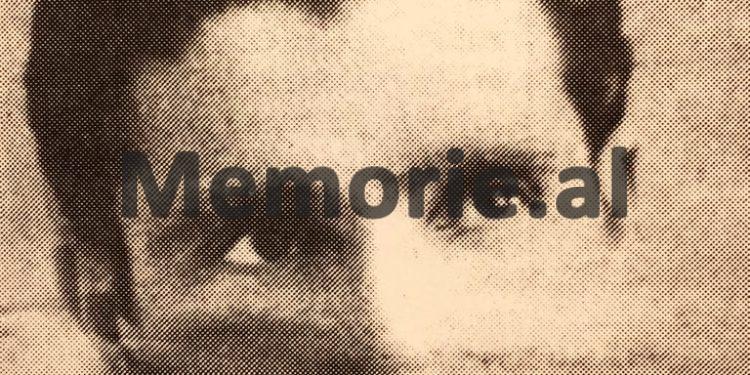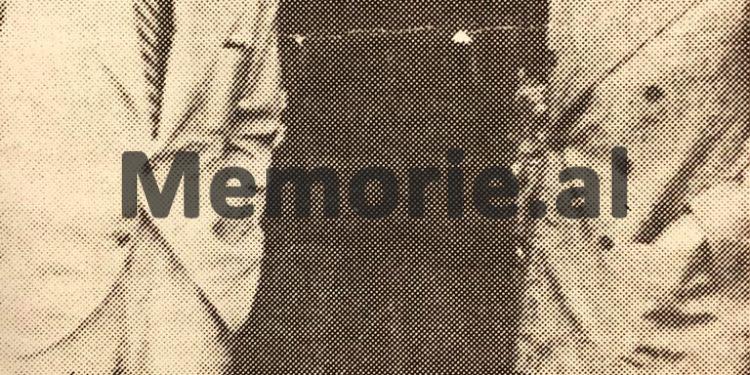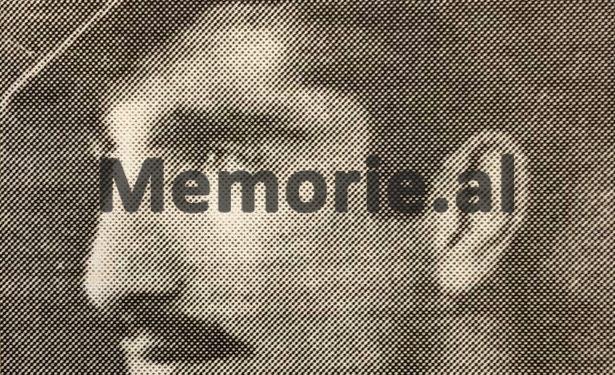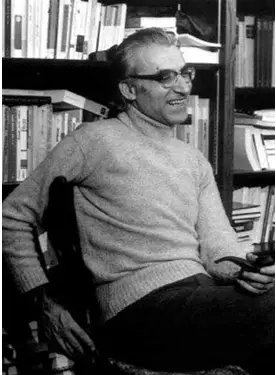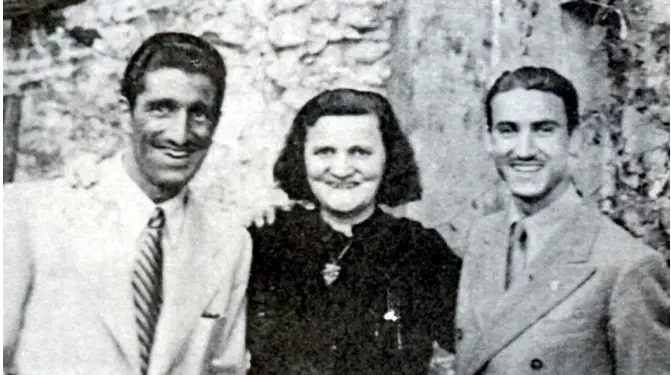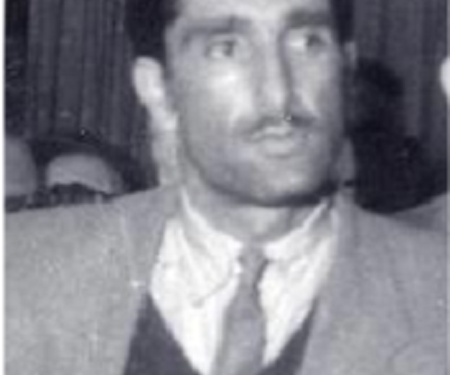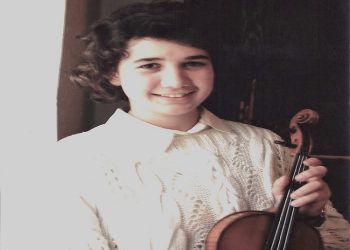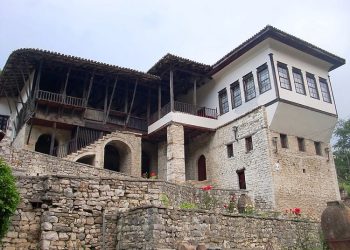Dashnor Kaloçi
Memorie.al / publishes the unknown story of the Pipa family originating from Libohova of Gjirokastra where the first after graduating from the most famous universities of the Ottoman Empire and served for several years in Istanbul in their professions, in 1912 returned to Albania, responding to the call of Prime Minister Ismail Qemali, to come and contribute to their homeland for the formation and consolidation of the new Albanian state. The rare and tragic story of one of her suckers, Myzafer Pipë, who after graduating from the classical gymnasium in the city of Shkodra where their family settled after returning from Turkey, gained a right to study and graduated in Law at the University of Padua in Italy, in April ’39, he was arrested and interned for several years on the island of Ventotene. Myzafer’s return to Albania in 1943 and his appointment as a judge in the Court of First Instance of Tuzi from where he quickly left resigning and returned to Shkodra and then to Tirana where he opened his law firm taking in very young anti-fascist defense. His arrest by the Germans after an article he did in the magazine ‘Fryma’ that he ran together with his brother, Arshiu and internment in the Pristina Camp from where he could be released in September ’44 and return to Tirana where he after the end of the War he reopened his office as a lawyer and in the Special Court, he defended Tahsim Bishqemi, Abedin Xhiku, Andon Kozmaçi and Manush Peshkëpinë, arguing fiercely with the presiding judge, Lieutenant General Koci Xoxen. His arrest in ’46, being accused of being a participant in the Postriba Uprising and his physical elimination in the Shkodra investigation, after the inhuman tortures inflicted on him by the chairman of the Internal Affairs Branch, Colonel Zoi Themeli.
“Myzaferi was a determined patriot and democrat with very progressive ideas for the time. He was against any kind of violence in the civil and political plan. In socio-political convictions and views, Myzaferi was and preached for a state with a parliamentary republic and true democracy, where priority was given to social policy in favor of the broad masses. Although Myzaferi was a staunch democrat and anti-fascist, he never participated or organized in any political force or group that emerged during that time because, according to him, he wanted complete independence in action, and also demanded that independence in free thought. After the extensive legal and socio-political culture, he also had deep knowledge in the literary and artistic field. He knew and felt both the popular and cultured music of Shkodra, as well as the classical one, of which he had deep knowledge, and he interpreted it himself from time to time as an amateur. Myzaferi was also a very loving and sociable type with a wide circle of friends, not only in Shkodra, but also in Tirana and everywhere. He was a vital and humorous type, who knew how to harmonize the jockey with the seriousness in work and civic life. Muzaferi was a connoisseur of several foreign languages and very fond of books, where their home library has been one of the most popular in the city of Shkodra. The guest was dressed with exquisite taste and had a sense of proportion in every step of life “.
This is how the well-known lawyer and publicist, Myzafer Pipa, remembered his brother-in-law (sister’s husband), Uran Kalakulla, a former political prisoner for 21 years in the communist regime of Enver Hoxha, who told us the whole story of the Pipa family, of which this writing which we have constructed according to his testimonies speaks.
Pipa family from Libohova, Gjirokastra, graduated in Istanbul
The Pipa family is originally from Libohova of Gjirokastra and according to the documents in the archives of Istanbul, one of the first of this family named Rashi, was the Governor of Rumelia. Rashiti also had two other brothers, Arshiu and Tafili, who graduated in Law and practiced as judges. Three generations later, Mustafa Pipa is known, who was educated and graduated in the capital of the Ottoman Empire for Jurisprudence, and together with his two other brothers, worked in the state administration. Mustafa was the father of Myzafer, who was born in Turkey in 1914. The Pipa family, responding to Ismail Qemali’s call after the declaration of independence, for the return to Albania of all intellectuals and patriots who wanted to contribute to the establishment and strengthening of the new Albanian state, returned home at the end of 1914.
From Turkey to the city of Shkodra
Mustafa Pipë’s family settled in the city of Shkodra where Myzaferi received his first lessons and graduated from the famous classical gymnasium of that city in 1936. Myzaferi was the first child of two sons and four daughters that Mustafai had from his two marriages. Throughout his high school years, Myzaferi differed greatly from his peers in both behavior and learning outcomes. He also excelled in physical training and was part of the football team “Vllaznia” of the city of Shkodra, where he played alongside Riza Lushta and Naim Kryeziu, two famous footballers who later played and excelled in Italian teams. In 1936, when he was still in high school, he scored the winning goal with the team from Elbasan, in a decisive match that has long been remembered by Shkodra fans.
Law student in Padua
After graduating from high school, his father, wanting his son, Myzaferi, to follow the family tradition, decided to send him to study in Italy in the field of Jurisprudence. This was not difficult to achieve, thanks to the excellent diploma of Myzafer, who met all the criteria to study at the University of Padua in Italy in the field of Jurisprudence. So, in September 1936, he left Shkodra and traveled to Italy along with many other friends who had won scholarships or study rights from the royal government. A few years before him, he had acquired the right to study and went to study in Italy with his brother, Arshi Pipa, who graduated from the Faculty of Philosophy in Florence in 1941. At that faculty in Padua together with Myzafer was also studied and graduated by Abaz Ermenji (later head of the “National Front”) Jakov Milaj, (well-known researcher) Nikola Shurbani, etc. In 1940, while Myzaferi was still a final year student at the university, with deep anti-fascist convictions, he was arrested by the Italian authorities in one of the bars of that city where Albanian students usually gathered. The reason for his arrest was the protest he made against the fascist aggression against Albania on April 7, ’39. In that bar Myzaferi together with some other friends sang aloud the song “Vlora Vlora / bjeri më lumtë dora”, which was the song that was often sung by Albanian students to remind Italians of Vlora of 1920 when thrown into the sea. After his arrest, he appeared in court and was sentenced to prison, being sent to serve his sentence in the famous Ventotene camp. Many other Albanians were interned in this camp at that time, such as high school professors from Korça, Abaz Ermenji, Safet Butka, Selman Riza, Faslli Frashëri, Abdurrahman Kreshpani, as well as Zef Mala, Emin Duraku, Masar Shehu, Abdyl Këllezi, etc., which represented the left current of that time in Albania. In the Ventotene camp at that time were interned as anti-fascists and some of the personalities of the Italian left, such as Sandro Pertini, (later President of Italy) Scotchimaro, Secretary General of the Italian Communist Party, Pietro Article, etc. Towards the end of 1940, after a year of exile, Myzaferi was released and returned to the faculty of Padua, where he received a diploma with high results.
Lawyer in Shkodra, defends anti-fascists
After graduating from the University of Padua, Myzaferi returned to his family in the city of Shkodra and that same year, he was appointed by the Albanian government to work as a judge in the Court of First Instance of Tuz, which was within the political borders of Albania. of that time, also known from the fascist Italy of Benito Mussolini. In that court Myzaferi did not work for even three months and resigned. He explained the reasons for his resignation, saying: “I did not finish school to punish people, but to protect them, especially when they are politically punished.” After that he returned and settled in the city of Shkodra, working as a lawyer in the studio of his father Mustafa. Except in the city of Shkodra, Myzaferi at that time practiced his profession as a lawyer and in Tirana, from where later in October 1943, all settled as a family. From 1940 to October 1943, during which time he worked as a lawyer, he participated in many political trials, courageously defending many people, mostly young people, who were accused of being anti-fascists. One of those “clients” who at that time was taken under protection by lawyer Muzafer Pipë and he was able to release him from prison, was the young anti-fascist, Vitore Kalakulla, who was captured by the Italian fascist police, pasting leaflets. Thanks to the qualified protection given to her by Myzaferi, she was able to save him from safe exile in the islands of Italy.
Testimony of Uran Kalakulla for the Pipa family
Regarding Myzafer and the whole Pipa family, his brother-in-law (sister’s husband), Uran Kalakulla, said: “It was an intellectual and widely cultured family, starting with father Mustafai, brother Arshiu, and their four sisters They were all educated and had deep anti-fascist convictions. Myzaferi was also a patriot and democrat determined with very progressive ideas for the time. He was against any kind of violence in the civil and political plan. In socio-political convictions and views, Myzaferi was and still is a preacher of a state with a parliamentary republic and true democracy, where social policy is given priority in favor of the masses. force or political grouping that emerged during that time because, according to him, he wanted complete independence in action, and also demanded that independence in free thought.After the broad legal culture and socio-political, he also had deep knowledge in the field of literature and art. He knew and felt both the popular and cultured music of Shkodra, as well as the classical one, of which he had deep knowledge, and he interpreted it himself from time to time as an amateur. Myzaferi was also a very loving and sociable type with a wide circle of friends, not only in Shkodra, but also in Tirana and everywhere. He was a vital and humorous type, who knew how to harmonize the jockey with the seriousness in work and civic life. Muzaferi was a connoisseur of several foreign languages and very fond of books, where their home library has been one of the most popular in the city of Shkodra. The guest was dressed with exquisite taste and had a sense of proportion in every step of life “, concludes the definition of his ‘portrait’, Uran Kalakulla.
Editor-in-Chief of the magazine “Fryma” in 1944
Myzaferi and Arshiu were not only brothers, but also friends of an ideal and thought. They understood each other by cooperating in several directions. So, around 1944, they both prepared and published the nationally progressive magazine “Spirit”. They published that magazine in the city of Shkodra and Myzaferi was its editor-in-chief. It was a very prestigious magazine at the time and managed to come out in seven-eight issues. As her collaborators at that time, she had some prominent pens and names in the field of letters, such as: Qemal Draçini, Besim Qorri, ing. Andrea Xega et al. As its editor, Myzaferi was distinguished for his sharp writings, where his erudition and professional competence in dealing with the socio-political phenomena as well as the literary ones of the time stood out. Thus, in the last issue of that magazine, Myzaferi wrote a long article, where he analyzed and criticized some of the mistakes of the Albanian government that was then under German occupation.
Arrest by the Germans and internment in the Prishtina Camp
It was that article which brought Myzafer endless anxieties, until he ended up arrested by the Germans. After that, in the summer of 1944, he was interned in the infamous Pristina camp. Gjikë Kuqali (“People’s Hero” was interned in that camp together with Myzafer at that time, but Myzaferi was released thanks to the intervention of one of the well-known personalities of Kosovo, who were known together in the intellectual districts of Tirana. the camp of Prishtina, Myzaferi dressed as a partisan and passing through the mountains, he came to Priska of Tirana where at that time large partisan formations had gathered, their main headquarters was located. The end of the war found Myzafer Pipë in his house in Tirana, next to his parents, sisters, brother Arshiu.Myzafer never thought of leaving Albania like many other nationalists, because he was known as an anti-fascist and had been condemned by both Italians and Germans.In these circumstances, he established and reopened a law office in the city of Tirana, to truar his profession.
Lawyer in the “Special Court” and debates with Koci Xoxen
He found Myzafer in his lawyer in early March 1945, when the communist regime of Enver Hoxha, who had descended with euphoria from the mountains, opened the “Special Court” to convict all those whom he considered war criminals. At that time, despite the severe and stifling climate that had been created for that trial by the communist government, where over 60 people were placed on the bench of the accused, Myzafer Pipa had the courage to take over the defense of Tahsim Bishqemi, Abedin Xhiku, Andon Kozmaçi and Manush Peshkëpi. who had been declared “war criminals”. Myzaferi tried to defend his clients with professional competence and dignity and during the court hearings he debated fiercely, both with the prosecutor, Major General Bedri Spahiu, and with the president of the court, Lieutenant General Koci Xoxen. Thus, in one of the hearings of that court, lawyer Pipa addressed Koci Xoxes, where, among other things, he said: “You are a piece of tin and you have neither the culture nor the proper legal dignity to judge these people you have brought here, where most of them are true patriots “This public stigma that Pipa did to the President of the Court, he would not easily forget.
Arrest and murder in the investigator
From the beginning of September 1946 on the outskirts of Shkodra began what is now known as the “Postriba Uprising”, where a large number of anti-communists hiding in the mountains, organized and attacked with weapons in the direction of Shkodra. Thus, after its suppression by the partisan brigades and the Pursuit Forces of the People’s Defense Division, commanded by Mehmet Shehu and Shefqet Peçi, mass arrests began. One of these people who was accused and arrested as the organizer and participant in that uprising, was Myzafer Pipa. That accusation against him was fabricated and did not stand at all, because not only did he not attend there, but he had no idea that such a thing had happened. According to the orders coming from Koci Xoxe and approved by Enver Hoxha, the most severe tortures directed by the Yugoslav instructors who were attached to the Ministry of Internal Affairs, which was then headed by the Minister, Colonel, were used against those arrested for Postriba., Haxhi Lleshi. These tortures were also used against lawyer Myzafer Pipë, where according to the archival materials that shed light on these processes, participated from the Chairman of the Internal Affairs Branch, Colonel Zoi Themeli, and other military personnel, such as: Nesti Kopali, Vaskë Koleci, Enver Mesi etc.., who at that time served in the Shkodra Branch of Internal Affairs. According to the testimonies of a Catholic clergyman who was then arrested together with Myzafer Pipë and who could have lived after many years in prison, Myzafer was burned with hot iron and then shot in the head, leaving him dead on the spot. After that, his lifeless body was thrown out of the investigation window, noting on his card that he was shot by prison guards after attempting to escape. Thus, the well-known lawyer Myzafer Pipa, who had been arrested and convicted as an anti-fascist with facts and evidence by the Italians and Germans and had escaped alive, could not escape the communists who arrested and convicted him without any evidence, not even giving him the opportunity to come out in what they call the “People’s Courts.” From that day and today, his family still does not know where the remains of Myzafer Pipa can be buried. /Memorie.al




